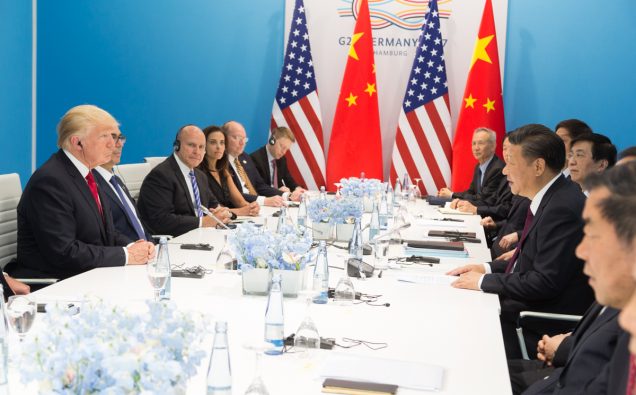
President Donald Trump was heading to France Friday for a G-7 Summit with ramifications of escalating U.S.-China trade war making headlines as the two largest world economies took tit-for-tat tariff measures within hours.
Trump called the trading relationship with China unfair after Beijing announced new taxes. He also asked American investors not to do business in China and look for alternatives. He criticized Chinese President Xi Jinping for a hike in trade tariffs on American goods.
As a consequence of the fast-paced actions and retaliations and unusual public recriminations, the stock markets tumbled with the Dow Jones Industrial losing 600 points.
“China should not have put new Tariffs on 75 BILLION DOLLARS of United States product (politically motivated!). Starting on October 1st, the 250 BILLION DOLLARS of goods and products from China, currently being taxed at 25%, will be taxed at 30%,” Trump said in a tweet.
“Additionally, the remaining 300 BILLION DOLLARS of goods and products from China, that was being taxed from September 1st at 10%, will now be taxed at 15%,” Trump noted in a tweet following Chinese announcement that it would be levying tariffs on US products.
“Sadly, past Administrations have allowed China to get so far ahead of Fair and Balanced Trade that it has become a great burden to the American Taxpayer. As President, I can no longer allow this to happen! “
Entrepreneurs worried that such a public display of aggressive trade war tactics from Washington and Beijing would unnerve investors and could precipitate a much-feared recession.
“While we share the president’s frustration, we believe that continued, constructive engagement is the right way forward,” Myron Brilliant, executive vice president and head of international affairs for the Chamber said in a statement, according to a USA Today report.
“Time is of the essence. We do not want to see a further deterioration of US-China relations,” Brilliant added.
According to IMF, the US-China trade war could cost the world economy as much as $455 billion.
But apart from upending the bilateral trade, the U.S. could see broader implications spreading to its access to Chinese capital.
On the other hand, Beijing would lose the world’s most robust consumer-driven market for its goods.
American consumers are considered to be the main drivers of world economic output and GDP growth.
The latest round of the trade bout began when China Friday said it would impose tariffs from 5% to 10 % on an additional $75 billion in U.S. products.
According to China’s Commerce Ministry 5,078 products would be affected, which a USA Today report says, would include soybeans, fruit and seafood, coffee, cars, auto parts, chemicals, whiskey, cigars, clothing and TVs.






![Chinese' Yangshan Port Photo By Bigg(g)er (Own work) [GFDL (http://www.gnu.org/copyleft/fdl.html) or CC BY-SA 3.0 (http://creativecommons.org/licenses/by-sa/3.0)], via Wikimedia Commons](https://www.viewsnews.net/wp-content/uploads/2017/05/Panorama-Yangshan-Port-1024x576.jpg)









